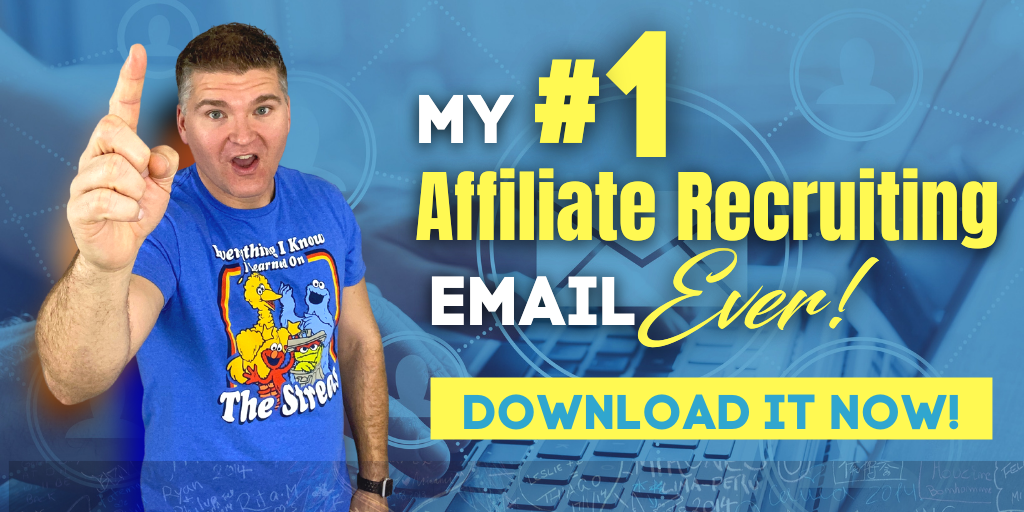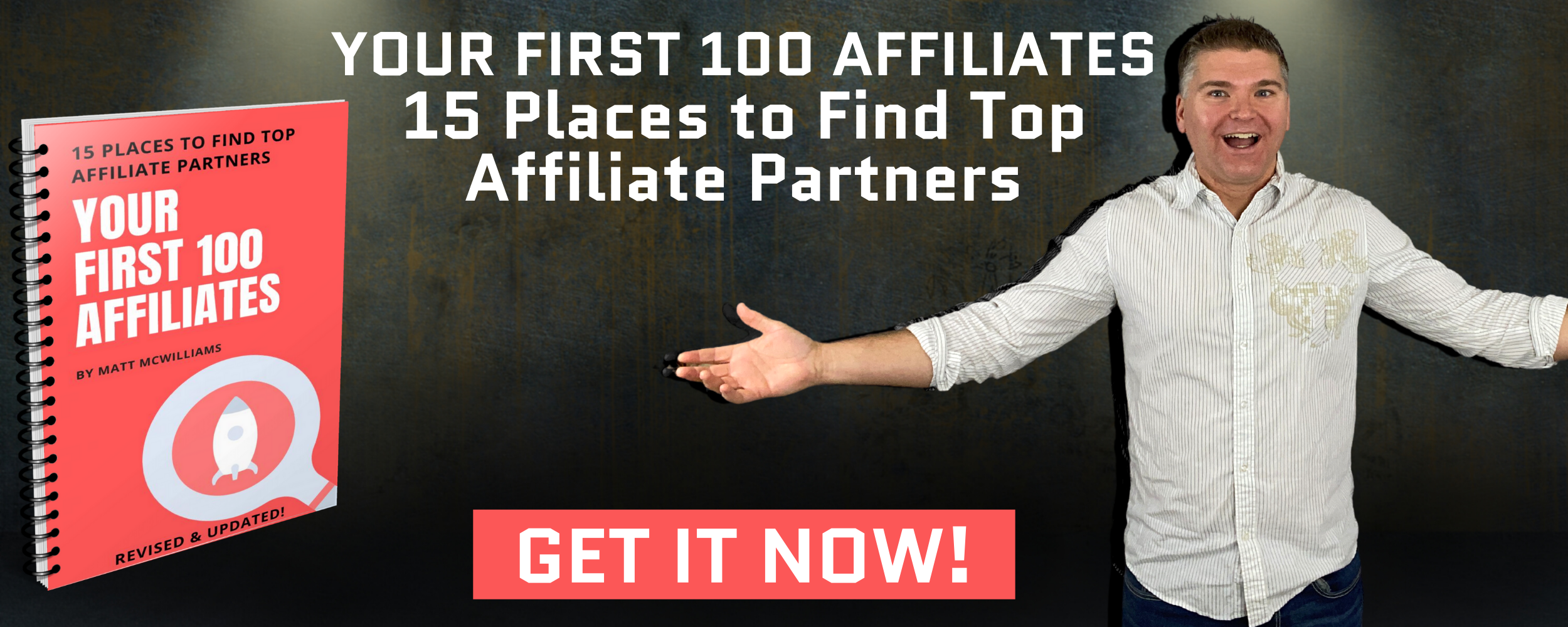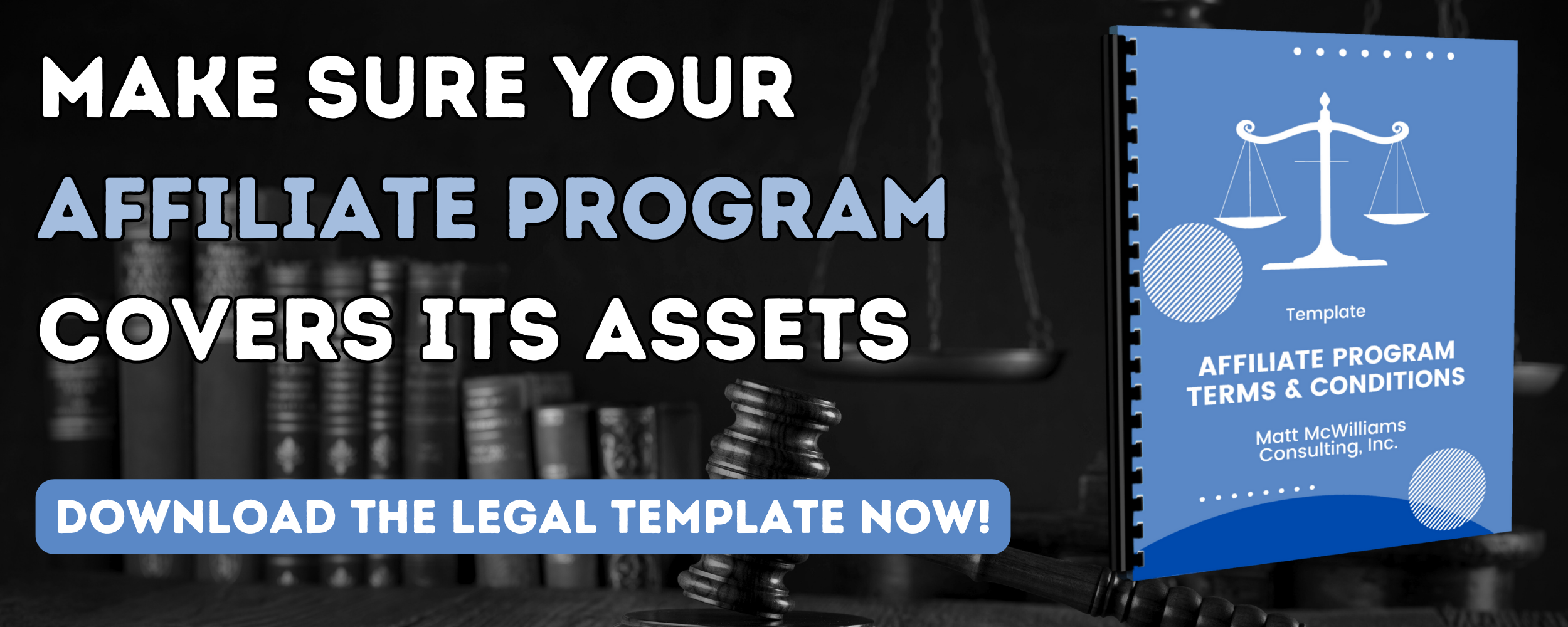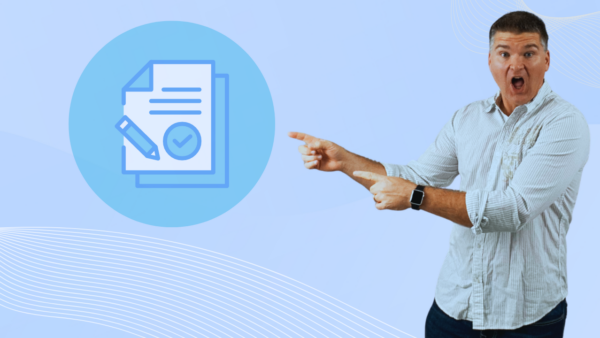What do the GREAT affiliate programs provide for their affiliates? If you are going to run a consistently growing, thriving affiliate program, it is YOUR responsibility to make sure your partners have everything they need to succeed. And I mean EVERYTHING. But what are the most important things you need to provide for them? That’s what this episode is all about.
Click Here for The Written Transcript of This Episode
Get my #1 affiliate recruiting email (the one I’ve personally used to recruit thousands of affiliates in dozens of niches). Grab your copy here!
Links Mentioned in this Episode
How to Give Your Affiliates Banners & Graphics
How to Create Mailing Plans for Your Affiliates
TEXT ME +1 260-217-4619
Don’t Miss An Episode – Subscribe Below
Previous Episodes of The Affiliate Guy
How to Build an Army of Loyal Affiliates
Got a Low-Priced Product? Here’s How to Run an Affiliate Program
How Top Affiliates are Closing Sales in 2024
How to Find Affiliates Using Affiliate Program Leaderboards
If Donald Trump Ran an Affiliate Program
How to Create Promotion Plans for Affiliates
How to Give Your Affiliates What They Need to Succeed
What do great affiliate programs provide for their affiliates? If you’re going to run a consistently growing, thriving affiliate program, it is your responsibility to make sure your partners have everything they need. And I mean everything. But what are the most important things you need to provide for them? Well, that’s what today’s episode is all about.
So one of the things that I’ve noticed over the past 16, almost 17 years now running affiliate programs is that the great affiliate programs provide five things for their affiliates.
These are pretty consistent. They’re across the affiliate programs that we’ve run, that we’ve seen friends of ours run, you know, people that we respect, great affiliate managers, you know, just companies that have good affiliate managers and the like that we’ve seen these five things and I’m gonna share today and, and it took a little bit of work. Those of you who know me know I love acronyms, makes it super easy to remember. And we’re gonna use the acronym.
Great. I will be the first to admit that one of the letters, and I’m gonna see maybe if you can guess what it is, hit me up on social media and let me know which letter you think it is. Took a little finagling. I had to like use thethorist. com
and kind of be like, okay, how do I get this to work? And that’s usually what happens, usually when I do one of these acronyms, a little behind the scenes here. And it’s like, you know, if there’s five letters, four of them are super easy, four of them are really, really easy, and then there’s one where it’s like, oh, I gotta, I gotta dig around. And I end up maybe with like a kind of a weird, like letter. You know, it doesn’t, the word is like not a commonly used one.
You know, things like that. I think of one of the acronyms that I used a while back and I can’t remember the actual acronym, but the A and it’s not the case today. The a ended up being the word alacrity. Well, alacrity is not a super common word. It’s actually a word my dad used all the time.
But I got there because I was like digging around on thesaurus. com and like, okay, I gotta go here. And then I found the word. I’m like, yeah, that kind of means what I want it to mean.
It’s not exact, but it works. So we got the acronym great here. And it starts with the g, of course, which is general direction. Affiliates need general direction. The first thing your affiliates need is guidance from you.
They need a target to aim at, okay? They need to know what to do. Like, exactly. Here’s the breakdown of the promotion. They need to know when to do it.
They need to know the calendar. They need to know how to do it, and also they need to know why to do it. What’s the why behind it? Now, we’ll talk about this a little bit more in the tea, but they need to know some of the backstory. Give them some behind the scenes.
Here’s why the launch breaks down this way. Here’s why we do the webinar on this day, because we found it converts better and things like that. It works better for our audience. So they need to know what to do, when to do it, how to do it and why to do it. And here’s the thing, don’t underestimate your own affiliate marketing experience.
Okay? And don’t overestimate their expertise. All right? So especially when you know the underestimating part there, right? Teach them.
Share as much as possible about what works in your niche. Share lessons you’ve learned from promoting launches or affiliate programs. Share success stories. Share experiments you’ve run. Share your experience promoting certain affiliate offers.
Right. And then don’t overestimate their experience, particularly when it comes to your product or your launch or your program. Just because they’re experts doesn’t mean that they can’t be taught. So don’t assume they know everything that they need to know. Don’t assume they know what to do.
Don’t assume they know when to do it, how to do it or why to do it. Share that stuff with them. Now, as far as things that you can share of your own experience, you know, share takeaways, maybe you promoted something a couple of months ago and you tried something or you saw somebody else do something. One of our former clients, Jeff Goins, did a great one. This probably like five years ago, he recorded a quick video and just basically shared a lesson that he learned promoting product launch formula.
All he did was say, you know, I accidentally did this and it worked really well. And I thought I’d share this with you. You could share a quick video just sharing a single lesson. You know when you do affiliate trainings, right. This is something that we do with our clients, and we highly recommend that you do where you host a quick 30, 40 minutes training.
If you want an example of our training, if you just go to mattmcwilliams. com affiliate training and I’ll put that link in the show notes, you can get a sample of it and you can actually, we’ll even give you the slides. We’ll give you the slides. You could literally take these slides, tweak them a little bit and do your own training.
Like, I’m giving you permission to do that. So don’t reinvent the wheel and then have a lot of Q and A at the end and just answer questions, you know, record a quick video with like a super quick lesson or post lessons to, you know, your affiliate Facebook group and things like that. So the big thing is just give them direction, give them guidance again, tell them what to do, when to do it, how to do it, and why to do it. So that’s the g, the r is the right graphics. They need the right graphics.
Now. Yes, email is king. You know, more people are, you know, doing emails that only have text in them because they tend to have better deliverability rates. Email is king, and text messages are coming up as well. But graphics are still important.
You need graphics for their blog posts, you need graphics for their emails. If they use graphics in their emails, you need graphics for banner ads. We’ll talk about that in a moment. They still are relevant. You need Facebook images and tweetable quotes and things for Pinterest and Instagram.
Now, if you want a video of how we provide these to our affiliates, like, to make it really stinking easy for them, I’m gonna have a link to a YouTube video. It’s like a two minute video that walks you through how to do that. But you also wanna have headshots, product graphics. So like a spread of your course. If you have a course or whatever, a physical product, show it being used.
If you are ready to take your business to the next level and start an affiliate program, start with my free report, Your First 100 Affiliates. This report takes nearly two decades of experience, trial and error, and lessons learned about finding top affiliates in nearly every conceivable niche and puts them all into one report. Grab your copy here!
If it’s a course, you know, like show it on a computer screen, show the person exercising, using the weights, whatever it is, right? Screenshots. If there’s videos, things like that, and you want to have a dedicated page in your affiliate portal, okay, now, if you want to keep it really low tech and super simple, you can use like a Google Drive thing, that’s fine. But if you’re looking to build your own affiliate portal, that’s something we can help with. I mean, we’ve built dozens of really high quality affiliate portals.
If you’ve promoted any of our clients, you’ve seen them, you know what they look like. So if you’re interested in that, just text me at 260-217-4619 and I can give you more information on those portals. But they need. I mentioned Banner ads. Like, you may be thinking, like, banner ads, really, what is, like 2006?
No, Banner ads still work. They still work in affiliate marketing. And we want to provide good quality banner ads. Now, I wouldn’t expect more than about three to 5% of your total sales to come from Banner ads, but, you know, it’s three to 5% if you have even, even a small launch, $100,000 launch, you know, or let’s say you’re doing $10,000 a month. How’d you like to add an extra 300, 400, $500?
That’s kind of cool. You look up at the end of the year, that’s, you know, five, $6,000. That’s not bad. If you’re a bigger company, it could be, you know, 500, $600,000. So you need to have different sizes of banners.
You need to have a blog sidebar. The traditional size there is 300 by 250. You want to have a leaderboard, which is typically 728 by 90. You want to have a Twitter size and a Facebook site. Those sizes are changing.
Pinterest, Instagram, whatever, social media networks, LinkedIn that your people are on, you want to have those graphics for them. So we want to give them general guidance. We want to provide them with the right graphics and the e. We want to provide them with examples of promo plans. And one of the most common questions I get when I’m running an affiliate promotion is, what are the best days to email and who do I send it to?
And so we created these sample mailing plans. We actually call them our ABC. I get, I love acronyms, apparently, even though that’s not really an acronym. But our ABC mailing plans. So the a is all in or aggressive.
So this is the plan for people who are in it to win it or they want to maximize their commissions. This is typically like 15 to 20 emails. And I’ll walk you through what that might look like in a moment. The balanced plan. Actually, let me skip to the c, the conservative plan.
This is like they just want to dip their toe in the water, right? They’re not 100% committed to a full promotion yet. And I’ll share about that in a moment. That’s usually like five to eight emails. And then the balance plan is the Goldilocks plan, right?
It’s. Yeah, it’s not too hot, it’s not too cold. It’s just right. This is between the all in and the conservative. And usually this is about ten to 13 emails.
Now, how I come up with those. So I’m gonna give you an example. The all in plan for one of Michael Hyatt’s promotions that we ran had six emails to their entire list.
That’s it. Even though this is the all in plan, there are only six to the entire list, three to unopens, and seven to engage contacts. And so what that looked like was three emails about the ebook. Starting on November 21, you sent the ebook to the entire list. A couple days later to unopens, a few days later to unopens again.
Now they had the Thanksgiving holiday in there, so we had to account for that. So there’s like a little bit of a gap. Then a couple days later, they sent the assessment to their entire list, then to unopened, and then a couple days later, the webinar promo. They did a handful of webinar emails and they went to their entire list and then again to their entire list. For that one, they sent the cart open to their entire list, but they sent the early bird deadline where there was actually a deadline after like the second day to get a discount.
They only sent the early bird deadline to their engaged contacts. These are people who had clicked on previous emails or opted in. Then they had another webinar around. So we did a couple emails to that and then the cart closed. The last five emails pretty much all went to just engage contacts.
Typically we recommend a cart open and maybe like a mid cart and a close cart email to your entire list, or at least to like the segment that you want to mail to because there might be people who didn’t opt in for the ebook or the assessment or the webinar, but they will buy the product. So at least one or at least two emails to your entire list for that. And so what we do is we come up with that. That was 16 emails. That was the all in plan.
Then what I did was I just backed in to, okay, what’s the conservative plan? You know, what does that look like? And so we definitely want to send the ebook to our entire list. So I’m like, I go back and I go, okay, 16. So conservative is probably going to be, we’ll say seven emails and we’re probably going to cut the entire list in half.
So we’ll go three emails, maybe four. We’ll go four emails to the entire list and we’ll go like two to unopened and maybe, you know, one to engaged contacts or something like that. Maybe three to your entire list. Make it really simple for them. Just three emails to your entire list.
That’s it. Two to unopens and two to engage contacts. And so like ebook to your entire list, ebook to unopens. And then we do like assessment to entire list. Assessment to unopens, and then we go webinar to entire list, webinar to unopened, and then a cart announcement, you know, to the engaged contacts, people who clicked on any of those emails, for example.
Now then what I do is I talk them into adding one more email about cart close, you know, maybe the morning of the deadline. Then I just kind of split the difference, you know, with that balance list. But it’s super easy. I have a video on how we put them together, put that in the show notes as well. So it’s super easy to put those together.
The other thing affiliates need in this, you know, here in this e of this example, affiliate promotion or, you know, example promotion plan, they need a promo checklist. Like this is by far the simplest way to get more out of your affiliate partners. A simple checklist really works. Really, really works. I mean, affiliates are people, and they are people who own their own business, and they are crazy, freaking busy.
Here’s the thing we have to remember about affiliates. They’re not lazy. They’re just busy. Your launch, your affiliate promotion, your product is not their number one priority. In fact, it probably falls somewhere between get the oil changed and update their Netflix preferences like it is not their number one priority.
It’s not even probably their top three any given day. So we give them a checklist like we created an affiliate promo checklist. And it absolutely works. All right. It absolutely works.
This checklist is proven to get tons more out of your affiliates. So very simply, it lets them know exactly what dates they should be mailing. It tells them when and where to post on social media, encourages them to mention the launch in their podcast, their live videos. I mean, the reality is, like, people like things to be simple, and a lot of people operate better using a checklist. I know I do.
And what it does is it puts the whole launch right in front of them and it encourages them to do more for each piece of content than just send a single email. Like I said earlier, email is king, probably always will be. But you can get some great results from social media and podcasts, especially if you’re sharing, like, the free pre launch content. And so by keeping everything in front of your affiliates, we’ve also noticed this significant drop in what we call mid launch dropouts, or mid promo dropouts. These are people who come out of the gates swinging.
They’ll send like 200 opt ins on day one, and day three, they’ll send another 150, and then they just disappear. Disappear. So this is a big problem. But we noticed that dramatically drops when we have affiliates using this checklist. And so we’ve noticed with our clients about a ten to 20% increase in sales since we started using this checklist.
Questions?
Text me anytime at (260) 217-4619.
Or…check out some of my free reports to help you get on the right track:
 |
 |
 |
 |
 |
 |
 |
 |
 |
That’s huge. Now, you might be asking if you need to create a new plan each time you run a promo. The answer is no, you do not. We use the exact same format. Exact same format.
So I’m going to put a link in the show notes. You can just grab the template. It’s just an editable word, doc. So you could upload it to Google Drive if you wanted to, even copy and paste it into Google Drive. But it’s super easy to use and we update it periodically.
You know, the original version had like, had like a para, had periscope and Google on it. I don’t know when’s the last time anybody used periscope? Maybe it’s still around. I have no idea. Or, you know, Google doesn’t exist.
And so we took those off. You know, we took those off. I think we put, you know, TikTok on there. If people are big on TikTok, for example. So grab that template.
It’s super, super easy to use. All right, so general direction, the right graphics, and you need to give them that e, the example of promo plans. Well, the a is you got to give them amazing swipe copy. Affiliates need amazing swipe copy. Swipe copy is super important, so making it great, making it amazing should be a priority.
And that means either taking a lot of time to write it or preferably hiring an expert to do so. All right? You do not want to provide mediocre or bad swipe copy. It’s just going to turn them off. You want to make it great, and if you do, they’ll go all in for your promotion.
So there’s five mistakes I see with Swipe copy. All right, I shared these. Gosh, I shared these many, many years ago, and I still see the same mistakes today. I’m not sure if I shared them on the podcast, though, so I think I shared them like a blog post. But the five mistakes I typically see is, number one, writing it yourself.
Now, I just said you got to take a lot of time to write it. Yep. If this is the only option, I’ll talk about, like, I strongly recommend hiring somebody else to write it. It doesn’t even have to be a professional copywriter because as the product owner, you are too close to the product to write great swipe copy. What you have to remember is swipe copy is a guide for your affiliates to use.
So it’s got to. It should be written from that perspective of an outsider, right? Not you. You put your blood, sweat and tears into the product, so you see things differently. So that’s mistake number one is writing it yourself.
Now, I will excuse you if you really, genuinely, just right now, don’t have the money to hire somebody, I totally understand, but you need to make sure you are putting yourself in the affiliate shoes and writing it from their perspective. Second, you don’t put images. You know, some people do use images in their emails very effectively. I don’t use them that often. When I do, though, my click rates skyrocket.
Should probably be a lesson for me, actually. But, you know, if you don’t include images or suggested images, then they might not know initially what to use. Third mistake is you only write one version. The problem with this is it assumes that every affiliate has the exact same audience. Your product probably reaches different demographics, different avatars, people who are different places in their life.
They have different struggles, they have different needs, they have different desires, and so you need different versions. Fourth, you write only long or short emails now, just like the one I just talked about, the different version. It assumes that every affiliate wants the same kind of copy. Some want the long form, others prefer short, shortened to the point. So you need to give that to them.
And then, fifth, you expect them to copy and paste it. In fact, you even encourage it. You tell them, just copy and paste this. No, no, no, no. Okay.
We always tell our affiliates not to copy and paste. The swipe, copy. It is unoriginal, it is ineffective, and a lot of times it backfires. So do not do that. So what do you do instead?
Number one, like I said, hire somebody to write it. Okay? Number two, include images. The four types of things that work particularly well for us are, if we’re sending to a video, a video screen capture. All right, a video screen capture.
You take a video screen capture, put a little play button over that. If you’re doing this yourself, it’s so easy. You take a screenshot, you upload it to canva, you put a triangle. You know, it doesn’t have to be something. It just looks like a play button.
I prefer goofy ones. So I pardon this, but I always prefer a screenshot. If I’m doing a video screen capture, I want a video screen capture that looks like I just smelled a fart or something like that. Like I want the goofiest thing possible. If you’re running a sale, give them a graphic representing the sale, stat.
Screenshots.
You know, if you mention statistics, then use a screenshot like, oh, look, here’s my increase in traffic to my website. And you see the spike. That’s kind of cool. You know, countdown timers or images. You know, if you have a countdown timer, give your affiliates the code.
If you don’t, then go get it. I’ll put links in the show notes. There’s a couple different services we recommend. They don’t even have affiliate programs. I don’t even have an affiliate link for them.
Create a countdown timer and give that to your affiliates. Third, you want to write different versions of your swipe copy for different audiences. When I was working with Jeff going to, I mentioned earlier, first thing I worked with him on was his book launch for the art of work. And as we were talking, we kind of identified these four core audiences. We had entrepreneurs, faith based stay at home parents, and what we called dreamers.
And so we created specific swipe copy for each of those four audiences. And the affiliates loved it. And the cool thing was, if you looked at that list and said, well, I don’t have entrepreneurs, dreamers, faith based people, or stay at home parents, you probably weren’t a good fit to promote. The book made that really easy. But if you looked at it and said, yep, I’m faith based, boom, you could grab the faith based copy.
I’ve got stay at home moms. Great. I’ve got stay at home dads. Awesome. I’ve got dreamers.
I’ve got entrepreneurs. Boom, you’ve got it. Fourth, you want to write different links of copy. Now, you don’t have to do this for every single thing like your cart close, you know, final email is probably going to be pretty short. You don’t need to write a long version for that.
But for your introduction, like the very first email, you want to have maybe a few different versions of the pre launch content. You know, the first piece, you want to have a different open cart email. Probably a day before cart close email. I recommend like a long FAQ version and a short reminder one. And then for the morning of cart close day, you probably want to have a couple different versions.
Now, other ones, you might have a long and a short version, too, but, you know, definitely for those four things. And then lastly, make it clear that swipe copy is a guide only. They are using it as a guide. They’re using it for inspiration. So tell them to make their emails personal and specific for their audience.
Show them, you know, I’ll put a link to a post that I did about how to use swipe copy and make sure that you send them to that post. You know, it’s kind of self serving, but do it right. Just send them to that post to how to use swipe copy. And then lastly, don’t forget about social swipe. We found this is, this is often an overlooked piece of content and launches.
We found that between twelve and 18% of all opt ins come from social media. So it’s a big deal. So you need to include versions for, you know, the mate, you may be listening to this five years from now and there’s like seven new social media networks. But, you know, for us, at the bare minimum, we do one for, you know, Twitter and then we do one that works for like, Facebook and Instagram for if we’re in b, two b, we’ll do one that works for LinkedIn as well. And then, like I said, images that are, you know, sized for that.
All right, so we want to give them some guidance. We want to give them general guidance, general direction. We want to give them the right graphics, we want to give them examples of promo plans and we want to give them amazing swipe copy. And then lastly, we want to give them a team atmosphere. A team atmosphere.
Affiliates need to feel like they are part of the process. People support the things that they feel like they’re a part of, right? This is true in every aspect of life. If you have a job, you support the initiatives, you played a role in planning. You know, if there’s a charity, you support the cause that you had a say in choosing.
If you’re forced to support a charity, it’s like, whatever, you know, it’s just money, who cares? That’s why it’s important to make your affiliates feel like they are part of the process because they are. So we want to create a team atmosphere. That means keeping them updated often, you know, if you’re running a launch, don’t show up out of nowhere a week before the launch and expect your partners to be excited. You need to include them along the way for weeks or even months ahead of your launch.
So give them behind the scenes access. Right. I’ve shared this before, but, you know, just shoot a quick video. If you’re on set, you know, share testimonials with them, post it in the partner group and, you know, like, just make them feel like what they’re doing is having an impact. I remember, you know, about three, about three years ago during our launch, we were going through the comments on.
So part of our launch we had a quick start guide and the comments that people were leaving. And I was like, mark, you got to go post those in the face in the affiliate Facebook group. And he went in and posted, he said, guys, you were seriously changing lives. You’re seriously changing lives. And he posted some screenshots of some of the, you know, comments that people left.
And one of them was like, well, I’ve wanted to do affiliate selling for 20 years and I’m just now going to do it. You were so kind, so dear. I think your program actually might work. You’re not too much of a hype guy for me. You know, I’ve been in business for 40 years, but some of the online guys are just too much hype for me.
I don’t need hype to sell. I just need to know how and expertise delivered kindly in a straightforward manner. And there was like all these comments, right? And so he, you know, mark then said, okay, here’s what I want you to do. Go opt into the guide or the video, you know, the same comments, basically, read some of the comments yourself.
Seriously, they will pump you up. Add your own response. Answering Matt’s question, seriously, imagine your people seeing your comment in there about how why you are excited about affiliate marketing. Hashtag huge for share a screenshot of your comment on social or in an email as social proof of what you’re telling your audience. And so he said, I’ll bet it helps.
You can’t tell me that at least one more person doesn’t opt in from seeing your comment. And so the point there is like, share those testimonials, right? Start a Facebook group. You have to have a Facebook group for your affiliates because then you can update them more frequently without clogging up their inbox. Also helps them to connect with each other.
Ask for their help, you know, ask for their opinion on things like logos or messaging. People love to feel a part of a decision like this and it dramatically increases the buy in and involvement. And then explain your thinking. You know, if you make a decision, any decision that affects them, let them know your thinking. Don’t just announce the change, explain the change.
Hey, guys, we decided to not do the webinar on Sunday. We’re moving it to Monday. Just wanted to let you know. That’s a terrible message. No, hey, guys, we decided to cancel the webinar on Sunday because of events that are happening in the world and we feel like moving it to sun, you know, Monday, just moving it back a day will give people some space to process things.
Over the weekend. You wanted to let you know so that’s the big update or something like that. Or we decided to add a third webinar because we found that, gosh, we actually ended up with 27% of our people that registered for this workshop are in the west coast, are in west coast time, Pacific time. So we wanted to give them an option to attend that wasn’t the middle of their day or something like that. You know, explain your thinking.
Make them feel a part of the process. So again, give them general direction, general guidance. Give them the right graphics, give them examples of, of successful promos and what they need to do. Make show them how they need to do stuff when they need to do it, why they need to do it and then give them amazing swipe copy and then create a team atmosphere. Make them feel a part of the process.
Make sure that your affiliate program has a solid agreement (AKA Terms & Conditions). To make things simple, grab my template here!
So as you can tell, you’ve got tangible resources like swipe copy, graphics, checklists. These are important, but the most important resources of all are a feeling of inclusion and general direction and that guiding your affiliate partners. When you provide your affiliates with these five things, these five must have, there’s no doubt that you’ll run a successful program. So come back for the next episode because I’ve got a juicy one. I’m going to show you how to build your affiliate army.
I showed you today what you need to give them. How do you get them? How do you build this affiliate army? I got a great question from Kate Makulova who asked, how do you find small and medium sized affiliates and build an army of affiliates? Well, I’m going to answer that in the next episode, so make sure you subscribe so you don’t miss it.
Hit that subscribe button. Tell your friends, if you know somebody running an affiliate program, they’re like, what do I do? What do I give my affiliates? Share this episode with them so they know. And make sure you subscribe.
I’ll see you in the next episode where you’re going to learn how to build your affiliate army. Thank you so much for listening today.











